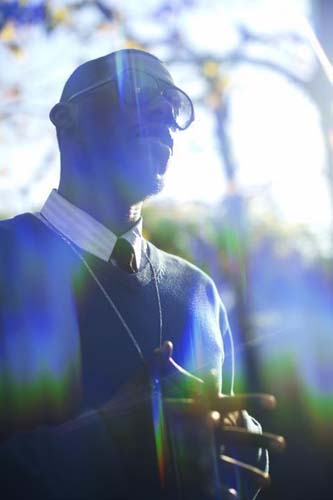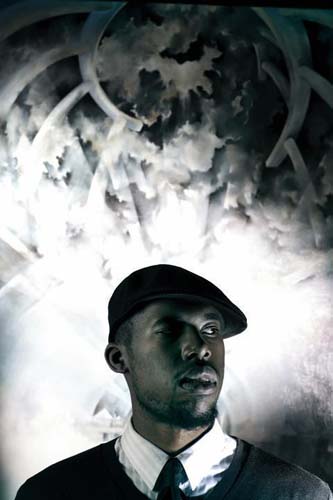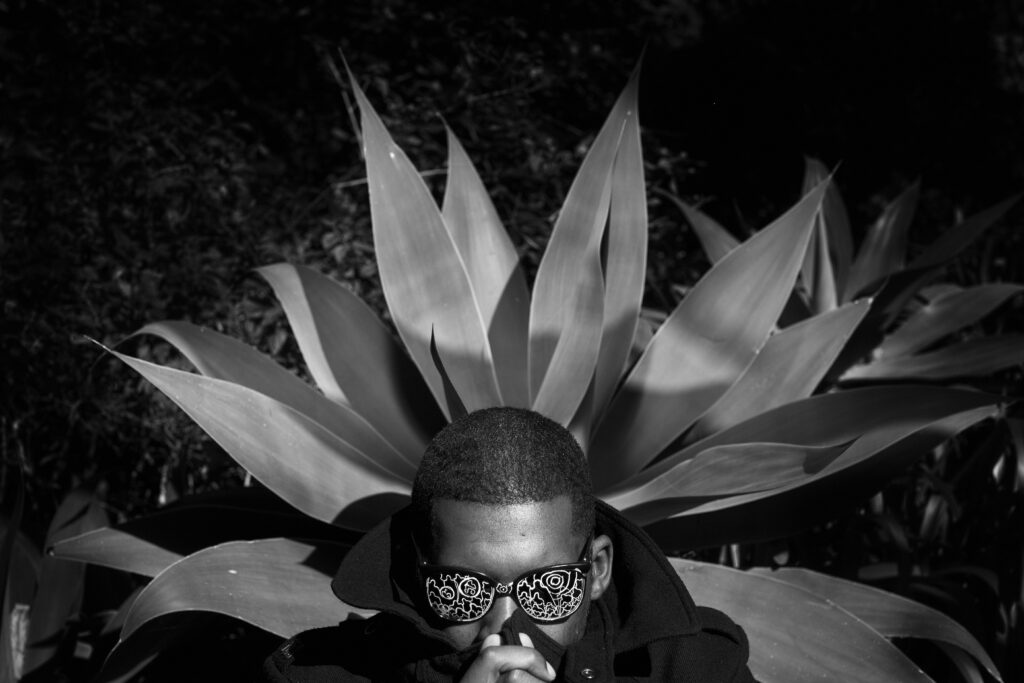Cosmogramma, the third record by Flying Lotus, is one of the records of the year to date, a so-called "space opera" steeped in ‘90s G-funk, downbeat electronica and the experimental, orchestrated cosmic jazz pioneered by his great aunt, Alice Coltrane. The Quietus grabbed some time with its maker, Los Angeles-based musician Steve Ellison, to talk drugs, video games and the rhythms of the universe.
Hi Steve. I’ve been warned you might be suffering from jetlag – how are you holding up?
Steve Ellison: Shit, you know that jetlag thing is ever-changing, you never get settled in any timezone – sleeping on airplanes, all that. I usually wake up early anyway, around six or seven o’clock. Add jetlag and it’s ridiculous. But I ain’t afraid of that shit, it gives me a weird edge in the day.
So you’re a lark rather than an owl?
SE: It varies. But lately the last couple of years, yeah.
That must be quite unusual in the firmament of electronic musicians – you expect to see more night owls than early risers.
SE: I used to be a night owl. Not any more. I smoked so much grass, man, I fall asleep really early. [Laughs] That’s one reason. No, that’s it [Laughs].
Do you think of Cosmogramma as a complete work, to be listened to as a whole?
SE: Oh yeah, I hope people think of it that way. I can’t tell people how to listen to it, obviously, but I would like people to listen to it kind of like…a suite, almost.
Tell me about the title, Cosmogramma – what does it mean?
SE: Well, the word had haunted me since I heard it the first time. I heard it by accident, I didn’t even hear it properly the first time, I heard ‘cosmic drama’. But I heard the word a couple more times, cosmogramma – what does that mean, is that a real word? And so I looked it up, and it refers to the study of the universe – a map of the universe, in relation to heaven and hell. And I was like, wait a minute, that’s where I’m headed! [laughs] It stuck, it kind of haunted me, I was trying to work out what to call this thing and I had lots of different titles in my head, what I was going to call it. The way it works out, just let it all reveal itself, the album title, songs, collaborations – it’s whatever the universe throws at us. Try not to seek out anything too much – all these things get us to where we’re at.
Who was it talking about this ‘cosmogramma’ in the first place?
SE: I was listening to a discourse that my aunt, Alice Coltrane gave. She was talking about the material world – how this world is all illusionary, how we’re all playing a part in this cosmogramma.
So how would you describe your spiritual worldview – is it grounded in any conventional religious or spiritual learning?
SE: No, there’s no specific thing. I have my own beliefs, but I always encourage people to look past their own beliefs and make sense of the world as they see it. The things I’ve seen in this world, and experienced in this world, there’s not too many books that talk about it [laughs]. I’m not even talking about psychedelics, I’m talking about like, true experience on this plane of existence – there’s so much more going on than this place, it really frightens me to even talk about things like this to people who probably don’t believe in anything at all. They probably wonder what the hell I’m talking about.
I think I might be one of those people. But it’s interesting to hear about, to read about this stuff. Have you read Doors Of Perception by Aldous Huxley?
SE: Yeah man, yeah. I have that book actually. Again, with psychedelics and all that stuff, it’s great as a lead in to different ideas. But people don’t question why we’re here still. People have just accepted the fact we’re like these incredible beings who have mastered technology and physics and all this shit. But there’s so much more going on – there’s so much more about where we’ve come from, as people and shit. They say we’ve just come from monkeys. But I believe there’s so much more than that.
The other school of thought says that we’re the result of a cosmic accident, that we’re just bacteria made good. But you think there’s a formula.
SE: Yeah, there are patterns in the universe, there are patterns in everything – I think there’s patterns in nature, cycles, earth ages. What the fuck man – there were dinosaurs, living here, on this planet! Otherworldly things happening on this planet. People don’t even trip. People want to talk about aliens and stuff, but aliens don’t care about us – we can’t even get past our own little fucking solar system, what the fuck do they want to hang out with us for? It’s like, going to hang out with the cockroaches.
Do you make music for yourself to listen to? Do you listen to your own records?
SE: Yeah it’s like a meditation for me, it puts me in a trance. When I listen to my music, I feel the most connected to this planet, and other places as well. You lose track of hours, and hours. That’s what trips me out. The third hour of listening – I’m like, how did I get here?
Do you think of your music as music to take drugs to, or is it music that replaces drugs?
SE: [Thinks] A little bit of both, you know. I can’t tell a person how they should get down. There are some drugs you shouldn’t take when you listen to my music.
Like what? Are you talking personal experience?
SE: There was some kid going, ‘Yo, I took some DMT while listening to your song!’. And I’m like, [disapproving] ‘Oh shit, what song?’. I wouldn’t listen to my shit on DMT. Too much. I’d rather hear some other shit. But I’m like, definitely not the sort to sit around listening to my own shit all the time. I’ll make something and I’ll listen to it on repeat. And then the next week I’ll be like, oh god, what was I thinking?
If you’ve got a sonic signature, it’s that your beats feel very slightly out of step. It has a quality that makes them feel slightly hallucinogenic.
SE: Yeah, it always feels like it might fall apart at one point – almost. But yeah, I don’t know. That’s just how I get down I guess.
This record has loads of organic instrumentation – a big step on from the last one, where that stuff was integrated, but this one feels a bit like an Alice Coltrane record in places – the harps, the lush orchestration.
SE: I was very, very moved by her music – obviously I grew up with it, but it’s taken on a different meaning for me in the last couple of years. I wanted to make sure people remembered that sound – the sound of harps, that out-there jazz music. I want that to be remembered.
Did you learn music from Alice, in a formal sense?
SE: Nah. She was super tough on me when I was a kid. She wouldn’t let me play the piano unless I was gonna play it. I was like, Auntie, can I play piano? And she was like, ‘Yeah – if you’re gonna play it.’ And so I was like, OK, maybe I’ll just go over there and not do that at all. Alice, she was more my spiritual mentor. She wasn’t really about the music in the time I knew her, she did her records and stuff long before I was born. She did one record in the ‘90s, early 2000, that was a really nice thing. But that was kind of a one-off, she chilled on making tunes. She was known to me most as someone who meditated. People would talk to her about music and would talk about John Coltrane, not her stuff.
But you grew up surrounded by jazz players?
SE: Yeah.
When you were first getting into hip-hop, did you play that music to them, did they appreciate it?
SE: Yeah, it took a little while for them to understand it, but my aunt got into it quite early on. Some of them are such intense jazz heads, though, they don’t recognise it – they were quite elitist about it.

I suppose even free jazz can be quite formally strict, it takes place inside boundaries.
SE: Yeah – if it’s not changing every three seconds they’re not tripping, it’s got to be the most out-there shit for them to even recognise it.
There’s quite a lot of other musicians on this record – Thundercat, Rebecca Raff, Ravi Coltrane. Are you starting to think of music collaboratively, or is it a solitary process?
SE: It was a solitary process. I’ve just recently been getting into the way of working with other people – it’s been so great, now I can be, oh right, I’ll stop right here and call Thundercat. [laughs] This could be something even crazier than I imagined if I make this phone call, go down this direction. They’re really into my influences as well, so we’ve got a lot to talk about.
There’s some bits on the record where you experiment with 8-bitty sound effects. Were you a keen video gamer?
SE: I’m still a keen video gamer, I love that shit. For the most part I grew up an only child, I was 10 or 11 when my little sister came round. I was a little boy and didn’t have too many friends, but I had Nintendo. Those sounds are part of my youth, part of my history.
Yeah, I was the same. I think we’re of the first generation when we had video games around at the age of four and five. Before I even really listened to music, I listened to the sound of games loading up, to early game scores. There’s something about the 8-bit sound It’s quite emotional, that makes me sound melancholy today – stuff like the Outrun theme tune…?
SE: Yeah, they had so emo melodies, you’re absolutely right. They’d loop over and over and over… super infectious music.
Do you use keyboards to emulate 8-bit sounds, or is it sampled?
SE: Yeah, I sample video games, run them through synthesisers.
So what do you play at the moment?
SE: I just beat this game Heavy Rain, on the PlayStation 3.
Ah, me too. I played it through in two six-hour bursts – it’s pretty difficult to put down.
SE: Fucking amazing stuff. [laughs]
I’ve got to say, I didn’t see the twist coming.
SE: Yeah, it’s like ‘Nooo!’ I’ve never played a game like that ever, but that there is the most engaging game I’ve ever played as a gamer. You know with games like that, you used to always skip over the cut-scenes, but with that, it was compelling – I couldn’t stop watching.
Click here to watch the ‘Parisian Goldfish’ video by Flying Lotus.
They’ve been trying to make games like films for so long but they’ve always been pretty bad, they’ve either not got the narrative, or the voice acting is unconvincing…
SE: I found it to be a better experience than a lot of the films I’ve seen recently too. I beat it once, and I want to beat it again to see the other endings.
Did any of your characters die along the way?
SE: I had a really bad ending the first time, but playing it again I got the cornball ending. But I still haven’t killed the Origami Killer. He gets me on the roof every time.
So. Thom Yorke is on Cosmogramma – guess I’d better ask, how did that come about?
SE: He had heard some stuff from a while back, and Radiohead commissioned me to do a remix for their Reckoning thing. I met up with Thom once after that. It was brief but really cool. We didn’t speak much about continuing the work, but I remember thinking how cool it would be if I could get him on the record. Mary-Anne Hobbs is a friend of his, and I think she encouraged it – so he hit me up, got in touch that day and asked me to send some tunes. I sent him a folder, and two days later I had the song in my email, with all these parts to work with. It was really cool, super-chilled out, considering what a big star he is. I’m really thankful, because the universe he’s created is a very special one, and he doesn’t invite many people into it.
What is the song about? Did you discuss with him what the lyrics might be about?
SE: He used the title I gave him [‘…And The World Laughs With You’]– that was another super-crazy thing. It meant a lot to me, the song title. That tune comes from a fucking tough time in my life. It’s like, as the song says, laugh and the world laughs with you. Cry, and you cry alone. At the time I was really feeling that. People don’t really care to be around when you’re going through tough times. No–one really know what you’re going through.

Good times are social. Bad times are anti-social.
SE: That feeling you’re kind of alien. He got that.
Hey, finally, everyone in the UK is going on about Mephodrone. Have you tried that?
SE: Oh my God, yeah – did I come over last during some weird drug epidemic?
There’s a moral panic about it in the UK at present. It’s just been made illegal.
SE: When did this stuff get popular?
A year or so ago. But it’s only in the last few months that it’s been made out as the danger drug.
SE: I’ve seen people take that shit and they looked crazy. But I didn’t dabble. Some of my friends – I’m not going to name names – did have a bit. I was like, what’s it like? And they just look at me crazy. I don’t know, I’m cool. I’ll just keep smoking weed.
And DMT?
SE: Oh, I’ve only done that twice, man. Heavy stuff. People get this idea I do DMT all the time, but no. You gotta respect that shit.



